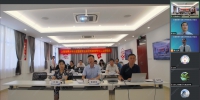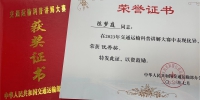中国国际广播电台|Gaokao to be Reformed: A Better Channel for Social Mobility?
Gaokao, or the National College Entrance Exam of China, is one of the most controversial topics in the country. Chinese Premier Li Keqiang said that the government will deepen the reforms on education and the enrollment system so that each person would have the opportunity to change their own destiny through education. He said this in the government work report he delivered during the opening session of this year's NPC, China's top legislature National People's Congress, on Thursday in Beijing.
What's included in the reforms? And will the reform make Gaokao a better channel for social mobility? Let's follow our reporter Chi Huiguang to find out.Just one day before the government report was delivered, on March 4, the Education Ministry of China announced that it will reform the Gaokao system and education enrollment, in order to further the educational fairness. On its official site, the ministry has published 40 key points of focus for this year.
The reforms include changes in scoring of Gaokao, which will come in a new 3 plus 3 format. Vice principal of the High School Affiliated to Beijing Normal University, Liang Yuancao, explains what it is.
The three major subjects of math, Chinese and English are still kept in the unified exam of national or provincial level. In addition, students have to choose 3 scores out of the elective subjects including politics, history, geography, physics, chemistry and biology to be included in their overall scores of Gaokao. The elective subjects should be chosen according to both their own interests or superiority, and the requirements of the university they want to enroll.
Zhou Xingguo, principal of AnShan No.1 Middle School in northeast China's Liaoning province says that universities will not base their judgment of applicants solely just on scores in the future.
We also take in consideration of comprehensive assessments on elective classes as well as evaluations on morality standards, physical health, art cultivation and social practices. It is a multivariate enrollment system.
Pang Weiguo
Professor Pang Weiguo from East China Normal University in Shanghai expresses positive attitude toward the reform: Students will be evaluated by their overall performances in their high school or even longer periods. For instance, some students who have strong capabilities on interpersonal communication or community and public welfare activities, which are hard to reflect on the test papers of Gaokao currently. So the comprehensive assessment is a more reasonable evaluation method.
Professor Li Ruifeng, deputy to the NPC from Taiyuan University of Technology in the province of Shanxi, says though having long been scolded for suffocating creativity, Gaokao has still been fair in selecting high-scoring students for the country's limited higher education institutions. However, he says the reform is a necessity and also an improvement to the current system.
First of all, it changes the system of determining your future with a set of tests during a few days. Especially the English exam. After the reform, students can take the test twice in one year, and pick the better result to add to their total score, which will ease the pressure from both the students and their families. And, the elective subjects policy of the comprehensive evaluation system gives both the universities and the students better chances to make better choices.
Li says, the elective-class teaching method breaks the traditional fixed class arrangement in Chinese high schools, and encourages students to plan for their academic future when they are in secondary schools.
Under the current system, students bury themselves in studying for 12 years of primary and secondary education, and only start to think what they would do in the future after the Gaokao. The reform will help inspire students' potential and encourage in-depth pursuit of their interests.
Principle Liang Yuancao voices his support for the change.
The new system also allows academically gifted students to advance to a higher-level class according to their interests and talents, after they meet the common requirements on other subjects.
Principle Zhou Xingguo also confirms high schools in Liaoning province will change their curriculum to align with the Gaokao reform.
Professor Pang Weiguo believes under the new enrollment scheme, colleges may favor a student by taking into consideration the score of one of the student's three elective classes. This is a glad tiding for those who are particularly good at one certain subject. It's a common phenomenon in the earlier age of Peking University and Tsinghua University to accept students not only based on their overall scores but also on their elective classes. Famous historian Wu Han, well-known writer Qian Zhongshu, and top scientist Qian Weichang would not have been able to attend college under the current system. The reform also take in consideration of these kinds of students, it's good for them.
Pang also says the reformed Gaokao becomes similar to the American Scholastic Assessment Test, or SAT.
David Moser, Academic Director at CET Chinese Studies of Capital Normal University in Beijing who comes from the United States, gives a comparison of the two biggest college entrance examination in the world. As some people may know that the SAT test for college entrance is only one of several criteria that colleges use to evaluate students in the United States. Some feels that it is a better system because it is a more comprehensive evaluation that looks at students from other angles, besides just the performance on the test. I think it is a good move for Chinese students to reform the Gaokao.
The reforms have also sparked discussion over how to ensure fairness of the Gaokao.
Many education experts say the reforms could objectively and comprehensively reflect students' improvement in middle school.
On the other hand, there are public concerns about the abuse of power. People are worried that the admission will have no clear standard if the significance of scores is reduced. Some are even concerned that those students from wealthier families or families with better social resources can get better certifications of social practices, which will bring new unfairness into the comprehensive evaluation system.
David Moser understands the worries: To be quite honest, this situation of unfairness still exists in the United States and in other countries, and it still exists under the Gaokao system. It's always the case that parents with better economic means are able to give their children better educational opportunities at home and in the schools. The reform of the Gaokao in this sense, cannot completely correct that problem. But I will also mention one other thing; I think the loosening of the pressure on the Gaokao might actually cause lowering in the amount of cheating in the Gaokao, because there was so much pressure in performing well in the Gaokao that students tend to put great effort into cheating. So I think it still good to do it though the question will not be totally solved by the reform.
Currently, the grading of extracurricular performances is within the discretion of teachers and some teachers just randomly give students scores before their graduation. Falsification of social engagement records is not an uncommon practice. Some parents worry they may have to trade bribes for better grades.
Liang Yuancao admits:The problems of unfairness or even corruption might exist in a short term. But they are avoidable. Schools do have their ways to confirm the certifications and evaluate the qualities. Moreover, most of the practical activities should be held within the schools. Activities outside the schools just occupy a small part. Even if there are false elements, it will never affect the results.
What Liang worries more is the fairness of evaluation within the schools. Zhou Xingguo gives out a solution:
We will design a quantitative system for the comprehensive evaluation. The standards and the ways of the evaluation will be published to the students and parents. The evaluation results of every student will also be shown to the public. It will be a transparent course that leaves no room for black box operation.
According to NPC Deputy Li Ruifeng, schools need more professional and persuasive replacements to convince the public that the change will not damage fairness but evaluates applicants more comprehensively.
One of the most important functions for NPC deputies is supervising and advising. There are a big number of deputies who are teachers from universities and schools all over the country. What we care about most is the education in China, which will play a decisive role in China's development. It says it takes ten years to grow trees but a hundred years to rear people. A good system is needed to help cultivate the talents of our people.
China resumed the Gaokao system in 1977. Since then, the exam has been called a single-plank bridge because of the wide gap between applicants and admissions.
But in recent years, Gaokao has attracted criticism for its suffocation of students' innovative spirit, leading to serious brain drain.
The number of students taking the Gaokao test has declined from its peak of 10.5 million in 2008 to some 9.4 million last year, and many top scorers chose to study in Hong Kong and Macau.
来源| 中国国际广播电台 本网编辑| 戴勇 阅读原文


